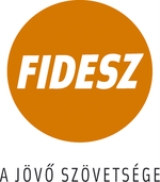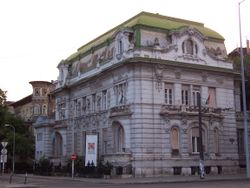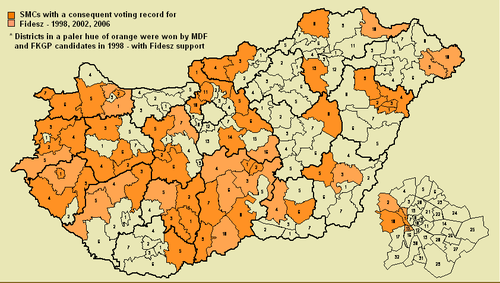
Fidesz – Hungarian Civic Union
Encyclopedia
The Fidesz – Hungarian Civic Union (ˈfidɛs; in full) is a major conservative party
in Hungary
. At the 2010 election in Hungary
, Fidesz-KDNP won a two-thirds majority of seats by gaining 52% of the votes, with Fidesz winning 227 seats and KDNP winning 36. Fidesz is a member of the European People's Party
(EPP).
, anti-communist party. Fidesz was founded by young democrats, mainly students, who were persecuted by the communist party and had to meet in small, clandestine groups. The movement became a major force in many areas of modern Hungarian history, engaging itself on every level in the development of a democratic system, its members being active as guardians of fundamental human rights. The membership had an upper age limit of 35 years (this requirement was abolished at the 1993 congress).
In 1989 Fidesz won the Rafto Prize. The Hungarian youth opposition movement was represented by one of its leaders, Dr Péter Molnár
, who became a Member of Parliament in Hungary. In 1992 Fidesz joined the Liberal International
.
Fidesz received 8.95% (1990), 7.02% (1994) and 29.48% (1998).
After its disappointing result in the 1994 elections, Fidesz changed its political position from liberal to conservative. In 1995, it added "Hungarian Civic Party" (Magyar Polgári Párt) to its shortened name. The conservative turn caused a severe split in the membership. Péter Molnár
left the party, as well as Gábor Fodor
and Klára Ungár, who joined the liberal Alliance of Free Democrats
.
Fidesz gained power in 1998 under leader and Prime Minister Viktor Orbán
, who governed Hungary in coalition with the smaller Hungarian Democratic Forum
and the Independent Smallholders' Party
. In 2000, Fidesz joined the European People's Party
and had its membership in the Liberal International terminated.
 Fidesz narrowly lost the 2002 elections
Fidesz narrowly lost the 2002 elections
to the Hungarian Socialist Party
, by 41.07% to the Socialists' 42.05%. Fidesz had 169 members of the Hungarian National Assembly, out of a total of 386. Following the defeat, the municipal elections in October saw huge Fidesz losses.
 In the spring of 2003, Fidesz took its current name, "Fidesz – Hungarian Civic Union".
In the spring of 2003, Fidesz took its current name, "Fidesz – Hungarian Civic Union".
It was the most successful party in the 2004 European Parliamentary Elections
, gaining 47.4% of the vote and electing 12 MEPs
including Lívia Járóka
, the second Roma MEP
.
Some considered the election of Dr. László Sólyom
as the new President of Hungary as the most recent success of the party. He was endorsed by Védegylet, an NGO including people from the whole political spectrum. His activity does not entirely overlap with the conservative ideals and he championed for elements of both political wings with a selective, but conscious choice of values.
In 2005 Fidesz and the Christian KDNP
formed an alliance for the 2006 elections
. Despite winning 42.0% of the list votes and 164 representatives out of 386 in Parliament
, they were beaten by the socialist and liberal coalition of MSZP and SZDSZ.
On October 1, 2006, Fidesz won the municipal elections, which counterbalanced the Socialist Party (MSZP)-led government's power to some extent. Fidesz won 15 of 23 mayoralties in Hungary's largest cities—although its candidate narrowly lost the city of Budapest to a member of the Liberal Party—and majorities in 18 out of 20 regional assemblies.
In the 2009 European Parliament election
, Fidesz won a landslide victory, gaining 56.36% of the vote and 14 of Hungary's 22 seats. This predicted a landslide in the 2010 parliamentary elections
, where they won the outright majority in the first round on April 11, with the Fidesz-KDNP alliance winning 206 seats, including 119 individual seats. In the final result, they won 263 seats, of which 173 are individual seats. Fidesz holds 227 of these seats, giving it an outright majority in the National Assembly by itself.
In 2002 the Fidesz list ran together with the MDF
. Before the 2006 elections MDF
separated from the coalition, replaced by the KDNP
in the alliance.
 In January 2010, László Kövér
In January 2010, László Kövér
, head of the party's national board, told reporters the party was aiming at winning a two-thirds majority at the parliamentary elections in April. He noted that Fidesz had a realistic chance to win a landslide. Concerning the radical nationalist Jobbik party's gaining ground Kövér said it was a "lamentably negative" tendency, adding that it was rooted in the "disaster government" of the Socialist Party and its former liberal ally Free Democrats.
Political party
A political party is a political organization that typically seeks to influence government policy, usually by nominating their own candidates and trying to seat them in political office. Parties participate in electoral campaigns, educational outreach or protest actions...
in Hungary
Hungary
Hungary , officially the Republic of Hungary , is a landlocked country in Central Europe. It is situated in the Carpathian Basin and is bordered by Slovakia to the north, Ukraine and Romania to the east, Serbia and Croatia to the south, Slovenia to the southwest and Austria to the west. The...
. At the 2010 election in Hungary
Hungarian parliamentary election, 2010
A parliamentary election was held in Hungary on 11 and 25 April 2010 to choose MPs for the National Assembly. They were the sixth free elections since the end of communist era. The 386 members of parliament were elected in a combined system of party lists and electoral constituencies...
, Fidesz-KDNP won a two-thirds majority of seats by gaining 52% of the votes, with Fidesz winning 227 seats and KDNP winning 36. Fidesz is a member of the European People's Party
European People's Party
The European People's Party is a pro-European centre-right European political party. The EPP was founded in 1976 by Christian democratic parties, but later it increased its membership to include conservative parties and parties of other centre-right perspectives.The EPP is the most influential of...
(EPP).
History
The party was founded in 1988, named simply Fidesz (Fiatal Demokraták Szövetsége, Alliance of Young Democrats), originally as a youthful libertarianLibertarianism
Libertarianism, in the strictest sense, is the political philosophy that holds individual liberty as the basic moral principle of society. In the broadest sense, it is any political philosophy which approximates this view...
, anti-communist party. Fidesz was founded by young democrats, mainly students, who were persecuted by the communist party and had to meet in small, clandestine groups. The movement became a major force in many areas of modern Hungarian history, engaging itself on every level in the development of a democratic system, its members being active as guardians of fundamental human rights. The membership had an upper age limit of 35 years (this requirement was abolished at the 1993 congress).
In 1989 Fidesz won the Rafto Prize. The Hungarian youth opposition movement was represented by one of its leaders, Dr Péter Molnár
Péter Molnár
Péter Molnár is a Hungarian academic and intellectual, working on questions related to communication law and freedom of speech.Molnár graduated from the Eötvös Loránd University in Budapest in 1987....
, who became a Member of Parliament in Hungary. In 1992 Fidesz joined the Liberal International
Liberal International
Liberal International is a political international federation for liberal parties. Its headquarters is located at 1 Whitehall Place, London, SW1A 2HD within the National Liberal Club. It was founded in Oxford in 1947, and has become the pre-eminent network for liberal parties and for the...
.
Fidesz received 8.95% (1990), 7.02% (1994) and 29.48% (1998).
After its disappointing result in the 1994 elections, Fidesz changed its political position from liberal to conservative. In 1995, it added "Hungarian Civic Party" (Magyar Polgári Párt) to its shortened name. The conservative turn caused a severe split in the membership. Péter Molnár
Péter Molnár
Péter Molnár is a Hungarian academic and intellectual, working on questions related to communication law and freedom of speech.Molnár graduated from the Eötvös Loránd University in Budapest in 1987....
left the party, as well as Gábor Fodor
Gábor Fodor
Gábor Béla Fodor was a Hungarian chemist and medical research scientist....
and Klára Ungár, who joined the liberal Alliance of Free Democrats
Alliance of Free Democrats
The Alliance of Free Democrats – Hungarian Liberal Party is a liberal party in Hungary, led since July 2010 by Viktor Szabadai . The SZDSZ is a member of the ELDR and of Liberal International...
.
Fidesz gained power in 1998 under leader and Prime Minister Viktor Orbán
Viktor Orbán
Viktor Orbán is a Hungarian populist and conservative politician and current Prime Minister of Hungary...
, who governed Hungary in coalition with the smaller Hungarian Democratic Forum
Hungarian Democratic Forum
The Hungarian Democratic Forum , abbreviated to MDF, was a centre-right political party in Hungary. It had a liberal conservative and Christian democratic ideology...
and the Independent Smallholders' Party
Independent Smallholders, Agrarian Workers and Civic Party
The Independent Smallholders, Agrarian Workers and Civic Party is a political party in Hungary...
. In 2000, Fidesz joined the European People's Party
European People's Party
The European People's Party is a pro-European centre-right European political party. The EPP was founded in 1976 by Christian democratic parties, but later it increased its membership to include conservative parties and parties of other centre-right perspectives.The EPP is the most influential of...
and had its membership in the Liberal International terminated.

Hungarian parliamentary election, 2002
The results of the Hungarian parliamentary election of 2002 are as follows:-External links:* ,...
to the Hungarian Socialist Party
Hungarian Socialist Party
The Hungarian Socialist Party describes itself as a social democratic party in Hungary. It is the partial successor of the communist Hungarian Socialist Workers' Party , which ruled Hungary between 1956 and 1989. The decision to declare the party a successor of the MSZMP was controversial, and...
, by 41.07% to the Socialists' 42.05%. Fidesz had 169 members of the Hungarian National Assembly, out of a total of 386. Following the defeat, the municipal elections in October saw huge Fidesz losses.

It was the most successful party in the 2004 European Parliamentary Elections
European Parliament election, 2004 (Hungary)
The European Parliament election of 2004 in Hungary was the election of MEP representing Hungary constituency for the 2004-2009 term of the European Parliament. It was part of the wider 2004 European election.The vote took place on 13 June...
, gaining 47.4% of the vote and electing 12 MEPs
Member of the European Parliament
A Member of the European Parliament is a person who has been elected to the European Parliament. The name of MEPs differ in different languages, with terms such as europarliamentarian or eurodeputy being common in Romance language-speaking areas.When the European Parliament was first established,...
including Lívia Járóka
Lívia Járóka
Lívia Járóka is a Hungarian politician of Romani ethnicity. She is a Member of the European Parliament, elected as part of the Fidesz list in 2004...
, the second Roma MEP
Member of the European Parliament
A Member of the European Parliament is a person who has been elected to the European Parliament. The name of MEPs differ in different languages, with terms such as europarliamentarian or eurodeputy being common in Romance language-speaking areas.When the European Parliament was first established,...
.
Some considered the election of Dr. László Sólyom
László Sólyom
László Sólyom is a Hungarian political figure, lawyer, and librarian who was President of Hungary from 2005 to 2010. Previously he was President of the Constitutional Court of Hungary from 1990 to 1998....
as the new President of Hungary as the most recent success of the party. He was endorsed by Védegylet, an NGO including people from the whole political spectrum. His activity does not entirely overlap with the conservative ideals and he championed for elements of both political wings with a selective, but conscious choice of values.
In 2005 Fidesz and the Christian KDNP
Christian Democratic People's Party (Hungary)
The Christian Democratic People's Party is a political party in Hungary.- History :The party was founded in 1944 by Hungarian Catholic statesmen, intellectuals, and ecclesiastical such as Bishop Vilmos Apor, Béla Kovrig , László Varga and General József Pálffy, among others...
formed an alliance for the 2006 elections
Hungarian parliamentary election, 2006
The schedule of the 2006 Hungarian parliamentary elections, as announced by president László Sólyom was as follows:* first round on April 9, 2006* second round on April 23, 2006...
. Despite winning 42.0% of the list votes and 164 representatives out of 386 in Parliament
National Assembly of Hungary
The National Assembly or Diet is the parliament of Hungary. The unicameral body consists of 386 members elected to 4-year terms. Election of members is based on a complex system involving both area and list election; parties must win at least 5% of the popular vote in order to enter list members...
, they were beaten by the socialist and liberal coalition of MSZP and SZDSZ.
On October 1, 2006, Fidesz won the municipal elections, which counterbalanced the Socialist Party (MSZP)-led government's power to some extent. Fidesz won 15 of 23 mayoralties in Hungary's largest cities—although its candidate narrowly lost the city of Budapest to a member of the Liberal Party—and majorities in 18 out of 20 regional assemblies.
In the 2009 European Parliament election
European Parliament election, 2009
Elections to the European Parliament were held in the 27 member states of the European Union between 4 and 7 June 2009. A total of 736 Members of the European Parliament were elected to represent some 500 million Europeans, making these the biggest trans-national elections in history...
, Fidesz won a landslide victory, gaining 56.36% of the vote and 14 of Hungary's 22 seats. This predicted a landslide in the 2010 parliamentary elections
Hungarian parliamentary election, 2010
A parliamentary election was held in Hungary on 11 and 25 April 2010 to choose MPs for the National Assembly. They were the sixth free elections since the end of communist era. The 386 members of parliament were elected in a combined system of party lists and electoral constituencies...
, where they won the outright majority in the first round on April 11, with the Fidesz-KDNP alliance winning 206 seats, including 119 individual seats. In the final result, they won 263 seats, of which 173 are individual seats. Fidesz holds 227 of these seats, giving it an outright majority in the National Assembly by itself.
Youth
The Youth of Fidesz is the Fidesz Youth Section that was created as a section within the party gathering all party members below the age of 30. It was founded by the Fidesz congress and established in December 2005. The chairman of Fidesz Youth Section is Dániel Loppert. Fidesz Youth Section is member of European Democrat Students (EDS) and observer member in the Democrat Youth Community of Europe (DEMYC).Electoral results
Results on the lists:| Year | Result | Voters | Status |
|---|---|---|---|
| 1990 | 8.95% | 439.481 | opposition |
| 1994 | 7.02% | 379.295 | opposition |
| 1998 | 28.18% | 1.263.522 | government |
| 2002 | 41.07% | 2.306.763 | opposition |
| 2006 | 42.03% | 2.272.979 | opposition |
| 2010 | 52.73% | 2.706.292 | government |
In 2002 the Fidesz list ran together with the MDF
Hungarian Democratic Forum
The Hungarian Democratic Forum , abbreviated to MDF, was a centre-right political party in Hungary. It had a liberal conservative and Christian democratic ideology...
. Before the 2006 elections MDF
Hungarian Democratic Forum
The Hungarian Democratic Forum , abbreviated to MDF, was a centre-right political party in Hungary. It had a liberal conservative and Christian democratic ideology...
separated from the coalition, replaced by the KDNP
Christian Democratic People's Party (Hungary)
The Christian Democratic People's Party is a political party in Hungary.- History :The party was founded in 1944 by Hungarian Catholic statesmen, intellectuals, and ecclesiastical such as Bishop Vilmos Apor, Béla Kovrig , László Varga and General József Pálffy, among others...
in the alliance.
Single Member Constituencies Voting Consistently for Fidesz
The SMCs shown on the image have voted for Fidesz ever since 1998. SMCs with a paler hue of orange elected FKGP candidates in 1998, as part of a pact between the two parties.
László Kövér
László Kövér is a Hungarian politician. He was a founding member of Fidesz from 1988, and he served as Minister without portfolio for the Civilian Intelligence Services during the Viktor Orbán administration...
, head of the party's national board, told reporters the party was aiming at winning a two-thirds majority at the parliamentary elections in April. He noted that Fidesz had a realistic chance to win a landslide. Concerning the radical nationalist Jobbik party's gaining ground Kövér said it was a "lamentably negative" tendency, adding that it was rooted in the "disaster government" of the Socialist Party and its former liberal ally Free Democrats.
External links
- Fidesz – Hungarian Civic Union Official website
- Fidesz page on the website of the European People's Party
- Speech delivered by Mr Viktor Orban at the 17th Congress of Fidesz upon his election as president of Fidesz - Hungarian Civic Union, 17 May 2003 (from Google's cache)
- The History of FIDESZ (from Google's cache)
- Hungary's PM calls confidence vote

